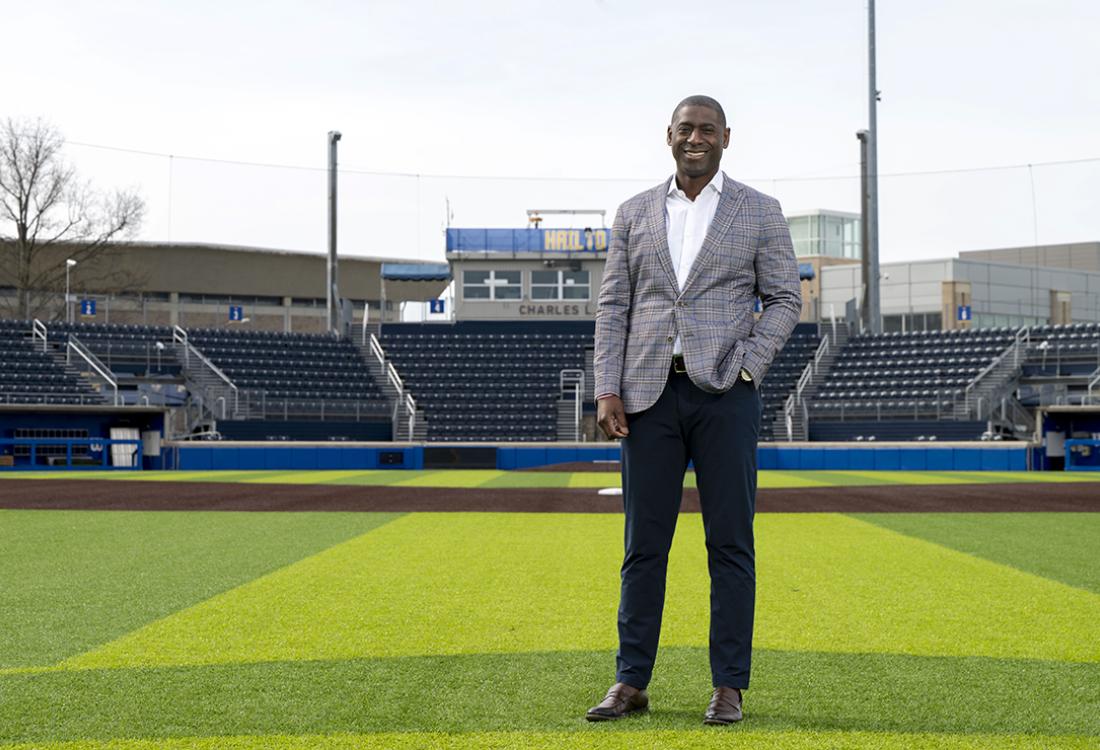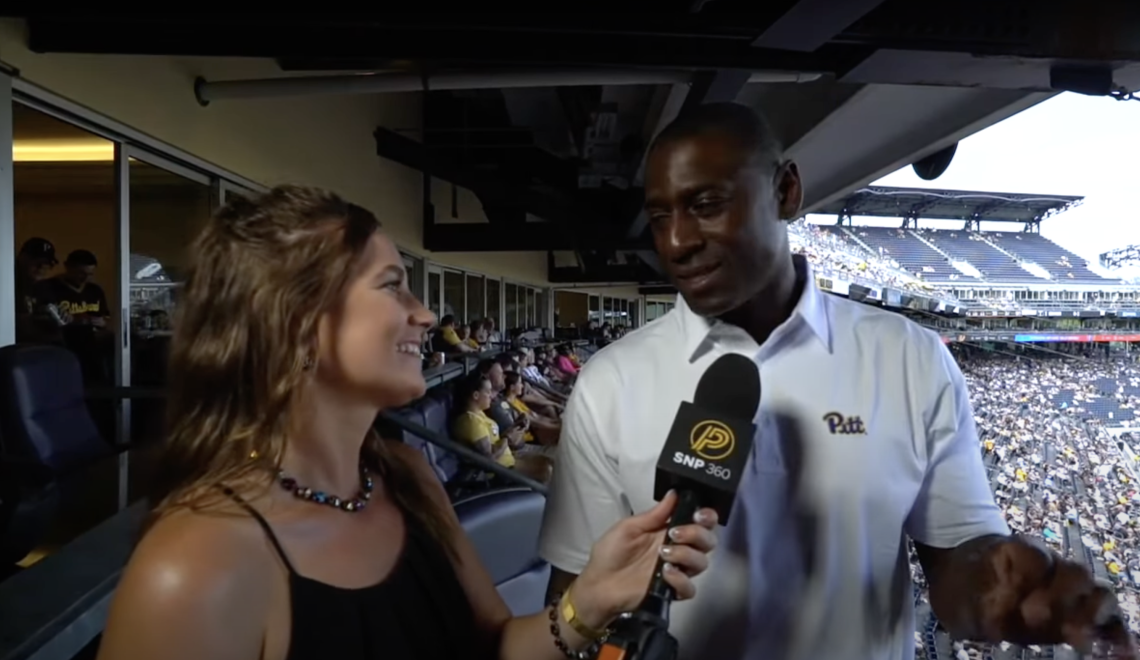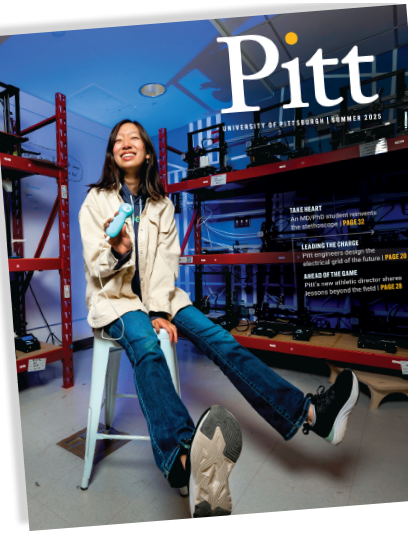
Growing up in Seattle, barely a day passed without Allen Greene and friends shooting hoops, sliding into bases or skipping into their own street games.
It was the late 1970s and early ’80s, an era when being a kid meant playing outside, and the son of Claude and Lynda Greene — an executive with Nordstrom and executive director of a non profit, respectively — joyfully romped into the sunshine.
For Greene, “playing sports was no different than breathing,” and the kid who would grow up to become Pitt’s athletic director found the fresh air of athletics everywhere, from the local playground to O’Dea High, the Catholic all-boys school where he played three sports.
Greene’s baseball prowess eventually earned him a scholarship to the University of Notre Dame, where he won on the field and in the classroom. His time at O’Dea and in college were “transformative,” Greene says, giving him a sense of brotherhood and confidence and nurturing the philosophy that winning was holistic, something that should manifest in all aspects of his life, not just sports.
“Sports,” he says, “give you a perspective that the journey is more rewarding than the destination.”
But the destination has been pretty good, too.
After serving as a three-year starter for the Irish, Greene was picked in the ninth round of the 1998 Major League Baseball draft by the New York Yankees. He later earned a bachelor’s degree in finance from Notre Dame and a master’s degree at Indiana University’s South Bend campus.
Prior to taking the helm at Pitt, Greene led departments and shaped student-athletes as director of athletics at Auburn University and as a senior deputy athletics director at both the University of Mississippi and the University of Tennessee. He was previously director of athletics at the University at Buffalo.
Pitt Magazine spoke with the University’s newly minted athletic director about the influence of sports on his life and his work. As a leading figure in the discourse over name, image and likeness (NIL), Greene also discussed new NCAA policies that allow student-athletes to earn money from their personal brand and the way that sports shape students’ futures.
“Our role is to meet them where they are and walk alongside them as they pursue who they hope to become,” Greene says. “Ideally, we help them stretch beyond even what they imagined was possible.”
The conversation has been lightly edited.
PITT MAGAZINE: How are team sports beneficial to society, to the individual?
ALLEN GREENE: They are a powerful training ground for essential life skills — among a few are self-discipline, sacrifice, resilience, time management, teamwork and the ability to embrace something bigger than yourself. These traits are the building blocks of a great teammate and, ultimately, successful organizations.
Beyond the scoreboard, team sports teach us to value diversity — not just in background, but in roles and strengths. A basketball team full of point guards won’t win many games and neither will one made up entirely of centers. Success comes from blending different talents, perspectives and personalities. It’s in that mix, working alongside people who aren’t like you, where growth and greatness happen.
What athletes have influenced you?
AG: Growing up, I had a lot of sports heroes who shaped how I played and how I saw the world. Pelé was one of the first. I admired his talent, of course, but he also had a huge social impact on me. Until I saw Pelé, I didn’t even realize that someone who looked like me could
play soccer at that level and be that revered.
Like most kids my age, I tried to mimic everything Michael Jordan did — the knee brace, the wristband, the way he wore his socks and of course the signature tongue out. I wanted to be just like him. Same with Ken Griffey Jr., though I could never replicate his swing, I taped my bat handle the way he did. Then there was Tony Gwynn — the ultimate hitter in my eyes. I still have his baseball card in my wallet.
But over time, it wasn’t just about style or skill — it became about the qualities they embodied. Their calm under pressure, their competitive spirit and their grit. Those attributes stuck with me and continue to influence how I approach challenges today.
So, what influences are you still using?
AG: That’s a great question. I often draw from the analogy of a master carpenter — someone who has a wide range of tools and knows exactly which one to use depending on the task. The most effective leaders, in any field, develop that same instinct: knowing when to lean into empathy, when to push and when to listen.
I try to lead with a steady hand — calm, intentional and transparent. I aim to be authentic in every setting, and I trust the people around me to do what they do best. Part of leadership, I’ve learned, is knowing when to step in, and just as importantly, when to step back.
Over the past 15 years, I’ve grown more comfortable in my own skin, and that’s been a powerful shift. It’s allowed me to be more open and to see vulnerability not as a weakness, but as a strength. I’ve come to believe that being genuine and willing to show that side of yourself creates deeper trust and more meaningful connections, regardless of the audience.
What is your vision for Pitt Athletics?
AG: Our goal is to cultivate an environment where everyone who represents Pitt Athletics, whether it’s our coaches, student-athletes or staff, has the support and resources to operate at their highest level, a championship level.
What are some steps to move Pitt toward this vision?
AG: Transforming a complex organization during complex times doesn’t happen overnight. It’s like steering a huge ship. Progress is made through a series of intentional and incremental adjustments focused on culture and strategy.
To achieve sustained success, we need a culture rooted in service. One that values strategic thinking, encourages calculated risks and embraces both accountability and imperfection. Most importantly, it has to be a culture where excellence is not just hoped for — it’s expected.
Who is being served in this culture?
AG: We’re in the business of serving one another — caring more about the success of others than your own. That mindset has shaped much of my recent leadership approach, and I believe it captures the heart of who we aspire to be: a team driven by selflessness, connection and shared purpose.
NIL is changing the landscape for student-athletes. How can Pitt be mindful of nurturing the whole student in this environment?
AG: To put things in perspective, real NIL impacts only about 1% of our overall student-athlete population, concentrated in football and men’s basketball. We recognize that NIL quickly turned into the pay-for-play model that we’re experiencing today, which impacts additional student-athletes across those sports and more. But what hasn’t changed is that 100% of our student-athletes should be focused on their holistic development, and we have an obligation to accompany them on their journey.
This industry is attractive to me because of the transformational impact we can have on young people’s lives. There is no greater privilege than helping young people grow, evolve and find purpose during some of the most pivotal years of their lives.
The Pittsburgh community should know that I am the person I am today because countless individuals invested in my holistic development, particularly during my college years. I’m indebted to intercollegiate athletics and am grateful to have the opportunity to return the favor. Furthermore, it’s my responsibility to lead this department with the same commitment to future leaders. We are an institution of higher learning, and our mission is to shape productive citizens. Every single day, we work toward that purpose.
What’s ahead for Pitt in the ACC and how do we ensure that Pitt’s stature among the upper echelon of athletic programs nationwide continues?
AG: The landscape of college athletics is shifting rapidly, and we’re operating in a more competitive and complex environment than ever before. But with change comes opportunity, and I believe Pitt is positioned to seize it.
We must be both bold and strategic. We must double down on what makes Pitt special — world-class academics, a proud community and a tradition of grit and excellence. But it also means making smart investments: in our people, our infrastructure and in services that help student-athletes thrive. We also need to be future-focused. That includes enhancing our philanthropic efforts, growing revenues in innovative ways and aligning with corporate partners.
Proudly, we’ve always punched above our weight class, and we are building this department to last all twelve rounds.
You come to Pitt from myriad professional experiences. What are you bringing with you?
AG: Everything, including the kitchen sink! I’d be doing a disservice to this role if I didn’t bring forward the lessons, insights and experiences I’ve gained from the different places I’ve been.
Over the past several months, I’ve pulled from each stop along the way, and I expect the same from everyone on our team. Whether you’ve worked at 10 institutions or only ever called Pittsburgh home, bring what you’ve learned. It all adds value.




